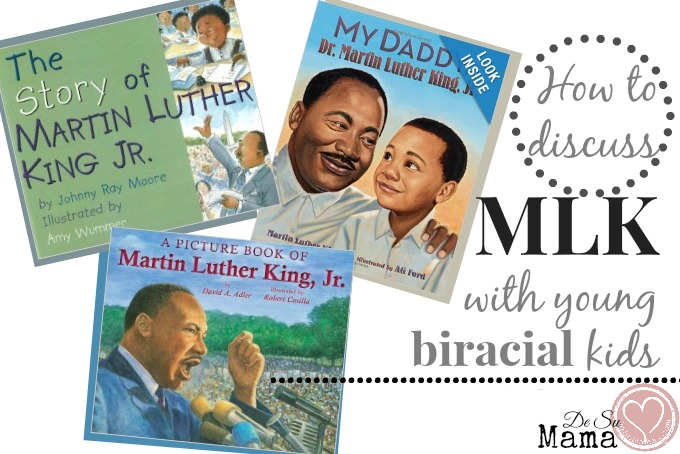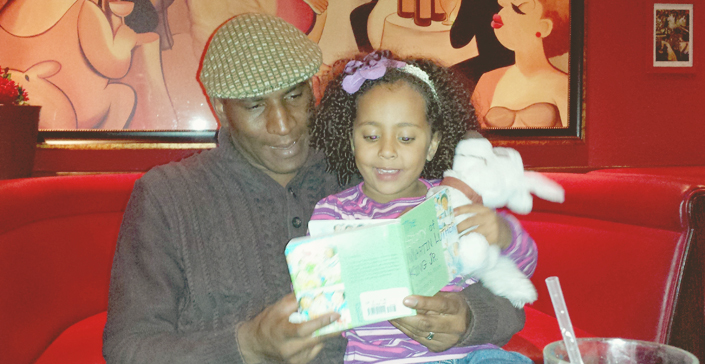Raising Multiracial Children: The Impact of MLK
Over the weekend, D and I had an interesting conversation on parenthood, raising multiracial and biracial children and MLK. The national celebration of Martin Luther King, Junior is today, but in raising very young kids, I wonder how much of the Civil Rights Movement they need to hear about at this very tender age.
With Alina becoming increasingly astute of skin color and race, we headed to the bookstore to enjoy an afternoon together and some books on the topic. I was actually surprised at the detail and sensitive topics broached in board books meant for toddlers. I loved this one written from the perspective of Martin Luther King’s son, giving our kids a young image from which to process. And this picture book allowed for a base of conversation, allowing a child-led discussion as deep or as shallow as your child wishes to take the subject.

How to Discuss MLK with Young Biracial Children
Raising biracial kids is much like raising any other child – we all want similar things for our babies: to grow up happy, with a solid foundation of self esteem and identity, and to excel in our society. But I do think there is an asterisk of sorts for kids with parents who look different, and that notation is exaggerated during the celebration of MLK and conversation of race and the Civil Rights Movement.
When the topic of race relations, racism and discrimination come up for a biracial child, we’re placing their identities at odds with each other – especially for the biracial child of white and black parents. When two white parents can focus on kindness, judging others equally, etc, the young white child has a linear focus. When two black parents teach their young child about their cultural history, the impact MLK had on their very own lives, the young black child has a grasp on their entire identity. The multiracial kid will have a unique experience.
Alina just turned 4 years old, Sebastian is firmly in the toddler years, so the lessons we have exposed our young biracial children to MLK is very limited. If you ask Alina right now who MLK is, she’d say “God”. And when you pose, “what did he do for our country?” she responds with a simple “he was nice to everyone”. And those responses are good enough for me.
In raising our multiracial and biracial children, I plan to lean heavily on Daddy D. In the same essence that I share my Latino culture, Daddy D is here to own and bestow this part of his identity with his kids. Having a relative or friend of African American descent to share and teach these messages allows our biracial kids to own the experience more wholly. It’s a part of our national history, but I want my kids to know their black dad owns it, is in command of his legacy and isn’t necessarily a victim of these scary images and stories found in even the youngest books on MLK.
Also, while this might seem utterly non-PC, I don’t want my kids (or any kids) to feel victimized by this challenging and frightening history. This is where Daddy D and I agree: in teaching our very young biracial children about MLK, we focus on his life and what he did. Not necessarily the horrid injustices he was fighting against. We use these MLK Quotes to set the foundation of inspiration; to look within themselves for self worth. We see color and celebrate multiculturalism. MLK was about elevating the black self esteem, as much as he was about eradicating segregation, and I want my young kids to remember that this amazing man our nation celebrates believed in them and the opportunities for their future.
As my babies grow and mature, we will introduce the Civil Rights Movement into our parenting. We’ll have to teach Sebastian how to be safe as a black boy in America. I gather that as Alina goes to school this will happen also, but as long as they’re little, I want the focus of MLK to be about empowerment. Strength in identity. A world that demands kindness, justice and fairness. Not just a description of one of the ugliest times in our history.
The point where Daddy D and I disagree is when to introduce reality – when to tell them that not everyone likes black people and how to survive and succeed in a society that, even today, systematically limits them. My heart sinks at this point.




4 Comments
Frances
January 22, 2014 at 8:13 amVanessa what a beautiful post. I too, have been uncertain on how to approach MLK with my 5 yr. old. We visited the library, but unfortunately the books that they had were geared toward 8+ and older. I will make notes of the books that you used with your children, and buy them. Also, your sentence about teaching your son to be safe in America, really hit a nerve. How sad for us as mamás of biracial kids have to teach them to be safe in their own country. ¡Que Dios nos ayude!
Ebony
February 7, 2015 at 4:54 pmI have 3 biracial children (black & white) and I too find this conversation a bit challenging, especially with my yougest (age 8). She came home the other day and said “my friends keep saying ‘sorry’ to me when we talk about black history in class. I don’t like this so I just go in the bathroom”. I explained to her that they weren’t being mean and she should simply say, “this is American history and MLK’s story is important to all of us.
Vanessa Bell
February 10, 2015 at 11:52 amWhat a great response to offer your baby girl, Ebony. Love it! We all have ownership of American history.
5 Ways to Celebrate Black History Month with Kids
February 27, 2014 at 8:32 am[…] literature: While there are many children’s books available on Black history (as well as Martin Luther King, Jr, whose national holiday is celebrated in January), take a moment to browse the read before offering […]